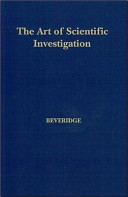Columbus As An Example of the Scientific Method
The role of hypothesis in research can be discussed more effectively if we consider first some examples of discoveries which originated from hypotheses. One of the best illustrations of such a discovery is provided by the story of Christopher Columbus' voyage; it has many of the features of a classic discovery in science. (a) He was obsessed with an idea—that since the world is round he could reach the Orient by sailing West, (b) the idea was by no means original, but evidently he had obtained some additional evidence from a sailor blown off his course who claimed to have reached land in the west and returned, (c) he met great difficulties in getting someone to provide the money to enable him to test his idea as well as in the actual carrying out of the experimental voyage, (d) when finally he succeeded he did not find the expected new route, but instead found a whole new world, (e) despite all evidence to the contrary he clung to the bitter end to his hypothesis and believed that he had found the route to the Orient, (f) he got little credit or reward during his lifetime and neither he nor others realised the full implications of his discovery, (g) since his time evidence has been brought forward showing that he was by no means the first European to reach America.
Notes:
His hypothesis, his observations, his search for funding, his experiment, his refusal to give up certain preconceptions, and his meager life and failure to be the first.
Folksonomies: scientific method experimentation experiment columbus
Taxonomies:
/science (0.401347)
/science/medicine/medical research (0.364503)
/society/unrest and war (0.118143)
Keywords:
meager life (0.950743 (negative:-0.515297)), certain preconceptions (0.945796 (neutral:0.000000)), Scientific Method (0.898729 (positive:0.403043)), additional evidence (0.872533 (neutral:0.000000)), experimental voyage (0.867503 (neutral:0.000000)), great difficulties (0.857793 (neutral:0.000000)), time evidence (0.852163 (neutral:0.000000)), bitter end (0.851534 (neutral:0.000000)), best illustrations (0.851509 (positive:0.517075)), little credit (0.834893 (neutral:0.000000)), Christopher Columbus (0.831369 (positive:0.517075)), classic discovery (0.827579 (positive:0.665796)), new route (0.826202 (neutral:0.000000)), new world (0.808696 (neutral:0.000000)), hypothesis (0.764182 (positive:0.490861)), Orient (0.658690 (neutral:0.000000)), idea (0.639846 (neutral:0.000000)), means (0.631286 (neutral:0.000000)), west (0.614554 (neutral:0.000000)), refusal (0.603667 (neutral:0.000000)), hypotheses (0.590095 (positive:0.578679)), contrary (0.587477 (neutral:0.000000)), failure (0.575188 (negative:-0.515297)), observations (0.574689 (neutral:0.000000)), discoveries (0.573425 (positive:0.578679)), Example (0.572997 (positive:0.403043)), search (0.572479 (neutral:0.000000)), funding (0.570092 (neutral:0.000000)), lifetime (0.568646 (neutral:0.000000)), implications (0.566743 (neutral:0.000000))
Entities:
Christopher Columbus:Person (0.845446 (positive:0.517075)), Columbus:City (0.604304 (positive:0.403043)), America:Continent (0.352502 (neutral:0.000000))
Concepts:
Scientific method (0.972170): dbpedia | freebase
Hypothesis (0.888650): dbpedia | freebase
Observation (0.779106): dbpedia | freebase | opencyc
Theory (0.753184): dbpedia | freebase
Empiricism (0.711374): dbpedia | freebase
Science (0.699242): dbpedia | freebase | opencyc
Christopher Columbus (0.698349): dbpedia | freebase | yago
Experiment (0.668011): dbpedia | freebase | opencyc






